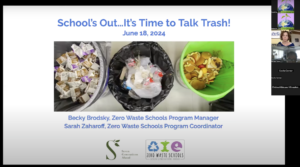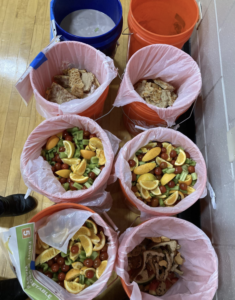 On Tuesday, June 18th, Seven Generations Ahead’s (SGA) Zero Waste Schools (ZWS) team and partners held a webinar covering the ins and outs of waste reduction in school kitchens and cafeterias. The webinar, titled “School’s Out… Let’s Talk Trash!” gave 94 attendees from around the country insights into key waste reduction strategies for schools and why they matter.
On Tuesday, June 18th, Seven Generations Ahead’s (SGA) Zero Waste Schools (ZWS) team and partners held a webinar covering the ins and outs of waste reduction in school kitchens and cafeterias. The webinar, titled “School’s Out… Let’s Talk Trash!” gave 94 attendees from around the country insights into key waste reduction strategies for schools and why they matter.
The scale of the food waste problem in schools is significant. Over seven billion school meals are served each year in the U.S. and much of that food ends up in landfills. Food scraps in landfills produce methane, an extremely potent greenhouse gas and major contributor to climate change. Meanwhile, in Illinois, one in six children experience food insecurity, making the human toll of this problem even more acute. School cafeterias also produce a large amount of plastic waste, which can include packaging materials, trays, and utensils.
So what can schools do? A lot!
The first and best option is to not produce the waste in the first place. “Our goal is to minimize the waste that’s produced as much as possible, and then we work to divert the waste by recycling and composting,” said Brodsky. “Any waste management program has the potential to decrease waste across all waste categories.” The first step in implementing a zero waste program is a waste audit. This helps a school determine where and how waste is produced, so they can create effective waste reduction strategies to address problem areas.

Offer vs. Serve (OVS) is a great method to reduce food waste. For schools in the National School Lunch and Breakfast program, students are allowed to decline up to two lunch items, as long as they take a fruit or vegetable. Share tables, where students can place unopened, factory-sealed school food and whole fruits, are another effective way to prevent waste and redistribute food.
There are many different strategies schools can use to reduce plastic waste, as well. For example, shifting foodware procurement choices from single-use materials like plastic trays and spork packets to reusable trays, silverware and cups makes a significant dent in the cafeteria’s waste stream. Bulk milk and condiment dispensers are another great option to reduce waste. Lastly, schools can communicate directly with families to encourage them to send their children to school with waste-free lunches.
After implementing waste reduction strategies, lunchroom composting and recycling programs provide a way to divert waste from landfills. With a bit of guidance for the students and clearly labeled sorting stations in the lunchroom, schools can significantly reduce the amount of landfill waste. SGA has helped schools reduce their lunchroom waste by 80% or more.
Kari Gassman, a member of the Environmental Defenders of McHenry County’s Waste Reduction Action Team, shared her journey with zero waste. It began when she took a job as a playground and lunchroom supervisor where she was shocked to see the amount of waste in the lunchroom. “Where I feel most passionate is that we’re failing to teach our kids that food is a valuable resource,” she said. “We teach our kids the nutritional value of food, but then we train them to treat it as trash when they’re not provided any alternative in the lunchroom.” She has seen that teaching kids zero waste habits is more impactful when they’re young since they are more adaptable. They may even bring those habits home, and hopefully carry them throughout their lives.
 As they began to implement zero waste strategies in her school, Gassman said they learned about small changes to make that would make a difference. For example, students were far more likely to eat fruits or vegetables if they were cut into smaller pieces. Observations like this allowed the kitchen staff to modify menus which helped reduce food waste. Gassman encouraged attendees to identify their “why” – what drives them to implement zero waste in their schools, whether it’s the positive financial or environmental impacts of these changes, redistributing food to hungry community members, or educating children.
As they began to implement zero waste strategies in her school, Gassman said they learned about small changes to make that would make a difference. For example, students were far more likely to eat fruits or vegetables if they were cut into smaller pieces. Observations like this allowed the kitchen staff to modify menus which helped reduce food waste. Gassman encouraged attendees to identify their “why” – what drives them to implement zero waste in their schools, whether it’s the positive financial or environmental impacts of these changes, redistributing food to hungry community members, or educating children.
“Yes, food waste is a big problem,” she said. “But as we’ve discussed today, big problems are solved by taking small steps.”
Cecilia Carmen, also with the Waste Reduction Action Team of the Environmental Defenders of McHenry County, encouraged anyone interested in making zero waste changes at their schools to contact the school and get the conversation started. She emphasized that it just takes one person to get the ball rolling, and that there are often people in the community interested in supporting these efforts.
Pamela King, the director of McHenry County Schools Environmental Education Program (MCSEEP), shared about the environmental education they provide to students in grades pre-K through 8th in McHenry County schools that cover topics as varied as recycling and composting, watersheds, and climate change. They also offer environmental education programs directly to teachers, and teach parts of their curriculum at various events throughout the county. MCSEEP was able to serve 10,000 students during the 2023-2024 academic year.
You can watch the full recording of the webinar HERE.
For anyone interested in starting a zero waste program at their school, check out the variety of resources available on SGA’s website.
